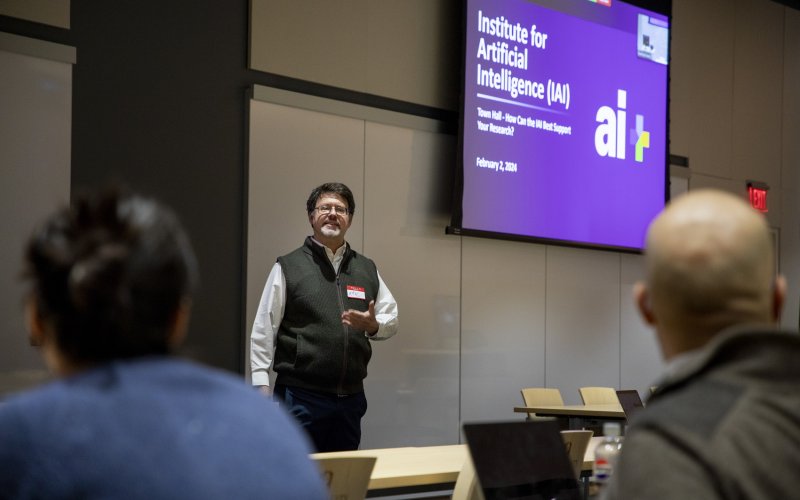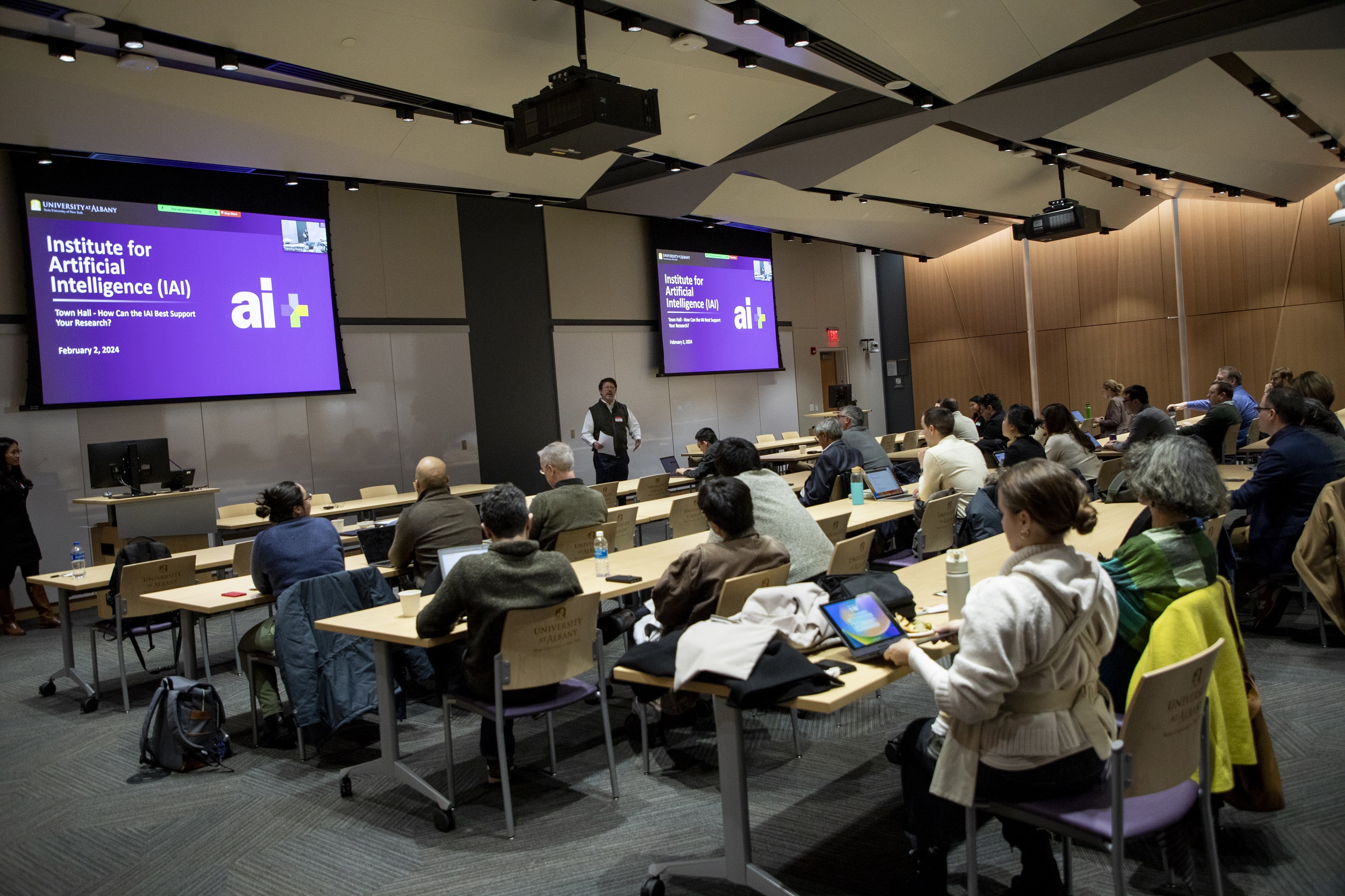Investing in an AI Future: A Q&A with Eric Stern

ALBANY, N.Y. (Feb. 13, 2024) — Eric Stern, professor and faculty chair at the College of Emergency Preparedness, Homeland Security and Cybersecurity, was named the inaugural interim director of the University at Albany’s Institute for Artificial Intelligence (IAI), effective in December.
Last year, UAlbany announced it would add an unprecedented 27 new faculty members specializing in artificial intelligence, as part of its ambitious plan to incorporate elements of AI teaching and research across all academic programs. The University welcomed 18 of those new faculty members this fall, with searches for the remaining positions now underway.
UAlbany IAI serves as a hub for interdisciplinary AI research, involving faculty from across campus, including the new hires.
Stern has a strong background in cognitive science, organizational learning and the application of emerging technology to problems of societal resilience and crisis leadership. His accomplishments are extensive, including garnering over $10 million in research grants and contracts from organizations worldwide, and serving as a UAlbany Technology in Government Faculty Fellow and a 2022 FEMA Vanguard Leadership Fellow.
He has recently published several books including The Oxford Encyclopedia of Crisis Analysis and Crisis Lawyering, as well as the second edition of the American Political Science Association Herbert Simon Award-winning The Politics of Crisis Management: Public Leadership Under Pressure. He is currently working on several federally funded projects, including a $3 million Department of Homeland Security-funded collaboration among UAlbany researchers to support emergency preparedness and response to weather extremes.
We caught up with Stern to learn more about the Institute for Artificial Intelligence and his role as interim director.
What type of support will the Institute for Artificial Intelligence offer for faculty?
I am a big believer in “servant leadership” so the first order of business will be to continue the conversation with the faculty and other key stakeholders about how the IAI can be most helpful to the UAlbany AI community and potential on and off-campus collaborators. In any case, a key focus will be to help identify opportunities and act as a “matchmaker” and force multiplier to bring qualified multi-disciplinary teams together to compete for major extramural grants and contracts.

Once fully staffed, the IAI will be able to provide various pre- and post-award support services to make it easier for faculty to apply for funding and manage funded projects. The Institute will also help develop strategic alliances with public, private, and non-profit sector partners and other scientific centers of excellence worldwide.
What are you hoping to accomplish as the institute’s interim director?
Over the next 12 to 18 months, while we search for a permanent director, the team and I will be focused on a number of objectives:
- Bringing together the UAlbany AI community, clarifying the role of the IAI and identifying areas of comparative advantage for research and education.
- Transforming the IAI from a compelling vision to a capable and growing unit.
- Supporting the search firm and search committee in their efforts to identify and recruit a world-class permanent director.
- Developing diverse and highly competitive teams to pursue federal and other funding opportunities and submitting a series of high-quality research and training proposals.
- Broadening and deepening our portfolio of AI partnerships on and off campus.
- Working with the Office of the Vice President for Research & Economic Development and ITS to help make our rapidly growing supercomputing capabilities more accessible to the faculty, students and other worthy on and off-campus users.
How does AI fit into your larger research interests and expertise?
I first encountered early work on AI when working on my dissertation “Crisis Decision-making: A Cognitive-Institutional Approach” many years ago. In recent years, my work has been heavily focused on the interplay of human, organizational, and technological factors as they enable and constrain decision-making, communication, and learning. A key question in my research is to what extent advanced information and communications technology can be used to compensate for human and organizational frailties with regards to making — and later processing experience and learning from — very high-stakes decisions taken under conditions of stress, uncertainty and ambiguity.
AI has tremendous potential to improve the quality of early warning systems and to create better conditions for crisis and strategic decision-making. I very much enjoy working with experts from other disciplines and professions and the AI space is particularly rich in terms of the potential to do innovative “convergence science.” Furthermore, intellectual challenges aside, AI stands out as a transformative but disruptive technology with great potential for both good and evil. AI can and will enhance human productivity and potential to prevent, cope with and recover from societal crises, but it also has a looming dark side rife with risks that need to be recognized and addressed responsibly. UAlbany is unusually well positioned to help with engaging both of those dimensions of AI and to have a lasting positive impact.
What makes UAlbany’s approach to integrating AI on campus different from other universities?
With the adoption of the AI Plus vision well before the explosion of interest in generative AI, sparked by the release of ChatGPT and similar products, UAlbany remains well ahead of the curve when it comes to developing and harnessing the power of AI. UAlbany is aggressively building both human capital (e.g. via the massive faculty cluster hire mentioned above) and supercomputing capabilities designed to push our campus to the forefront of AI research and development. University leadership was early to recognize that AI would be a game-changer with profound implications for nearly every facet of modern life — and not least for research and education.
The AI Plus approach is innovative and UAlbany has received a lot of attention in the media — including the higher education press — for its inclusive mainstreaming of AI. Rather than concentrating AI expertise in one or even a handful of technology-focused units, we are spreading AI expertise across campus in a sincere effort to bring AI to the entire university community and encourage partnerships between AI specialists and those who have problems and use cases where AI can help. This approach, combined with a commitment to AI literacy and readiness for all our students is distinctive, forward-looking, and powerful. Of course, when AI faculty are dispersed across campus, there is a need for a hub and focal point to bring the AI community together and — to use a favorite UAlbany phrase — help to unleash greatness. That is where the IAI comes in.




